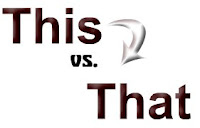
They're pronounced the same, but, technically speaking, there is a distinct difference between a disc and a disk.
Discs
 A disc refers to optical media, such as an audio CD, CD-ROM, DVD-ROM, DVD-RAM, or DVD-Video disc. Some discs are read-only (ROM), others allow you to burn content (write files) to the disc once (such as a CD-R or DVD-R), and some can be erased and rewritten over many times (such as CD-RW, DVD-RW, and DVD-RAM discs).
A disc refers to optical media, such as an audio CD, CD-ROM, DVD-ROM, DVD-RAM, or DVD-Video disc. Some discs are read-only (ROM), others allow you to burn content (write files) to the disc once (such as a CD-R or DVD-R), and some can be erased and rewritten over many times (such as CD-RW, DVD-RW, and DVD-RAM discs).All discs are removable, meaning when you unmount or eject the disc from your desktop or Finder, it physically comes out of your computer.
 Disks
Disks
A disk refers to magnetic media, such as a floppy disk, the disk in your computer's hard drive, an external hard drive. Disks are always rewritable unless intentionally locked or write-protected. You can easily partition a disk into several smaller volumes, too.Disks are usually sealed inside a metal or plastic casing (often, a disk and its enclosing mechanism are collectively known as a "hard drive").
Resource: itsalltech.com


No comments:
Post a Comment
Hey! Thanks for leaving your comment!